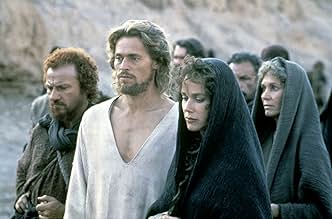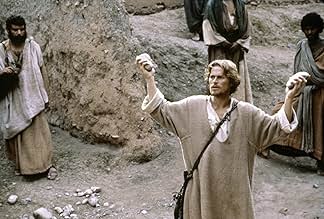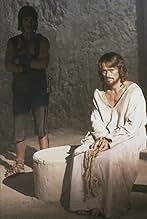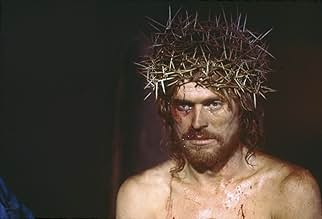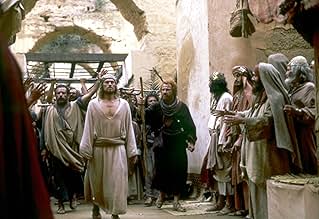A vida de Jesus Cristo, sua jornada pela vida enquanto enfrenta as lutas de todos os seres humanos e sua tentação final na cruz.A vida de Jesus Cristo, sua jornada pela vida enquanto enfrenta as lutas de todos os seres humanos e sua tentação final na cruz.A vida de Jesus Cristo, sua jornada pela vida enquanto enfrenta as lutas de todos os seres humanos e sua tentação final na cruz.
- Direção
- Roteiristas
- Artistas
- Indicado a 1 Oscar
- 2 vitórias e 7 indicações no total
Steve Shill
- Centurian
- (as Steven Shill)
- Direção
- Roteiristas
- Elenco e equipe completos
- Produção, bilheteria e muito mais no IMDbPro
Avaliações em destaque
This adaptation of Nikos Kazantzakis's novel, directed by Martin Scorsese, caused quite a stir on its initial release, accused of blasphemy and of causing offence to the Christian religion.
However, in its depiction of Jesus Christ as a human being rather than a man divine, it gets to the core of his story. This is a man who makes the choice of self-sacrifice for the good of his fellow men, despite the temptations of an alternative life - shown in this film by a life with Mary Magdelene rather than dying at the Crucifixion.
Played by Willem Dafoe with great sensitivity, this Christ performs miracles and discusses the intricacies of life and death with his disciples. Harvey Keitel is Judas, a rough man who fails to understand the significance of being the chosen Son of God; while Barbara Hershey is an effective Magdelene. David Bowie makes a short appearance as Pontius Pilate and is surprisingly good.
'The Last Temptation of Christ' is not one of Scorsese's best films but it certainly sparks questions and leaves food for thought. Some of the imagery is superb and the script is coherent and of a high standard.
However, in its depiction of Jesus Christ as a human being rather than a man divine, it gets to the core of his story. This is a man who makes the choice of self-sacrifice for the good of his fellow men, despite the temptations of an alternative life - shown in this film by a life with Mary Magdelene rather than dying at the Crucifixion.
Played by Willem Dafoe with great sensitivity, this Christ performs miracles and discusses the intricacies of life and death with his disciples. Harvey Keitel is Judas, a rough man who fails to understand the significance of being the chosen Son of God; while Barbara Hershey is an effective Magdelene. David Bowie makes a short appearance as Pontius Pilate and is surprisingly good.
'The Last Temptation of Christ' is not one of Scorsese's best films but it certainly sparks questions and leaves food for thought. Some of the imagery is superb and the script is coherent and of a high standard.
10CSM126-1
Condemned by Fundamentalists upon release, delayed by outcries from hypocrites and liars, and boycotted in any city where it played "The Last Temptation of Christ" is one of the most controversial movies ever made. Instead of showing Christ as a fearless and perfect person, "The Last Temptation" depicts Him as a person who fought his destiny and wished to be just another mortal human being. Religious groups who couldn't (and still can't) accept the fact that Jesus was human were shocked by such ideas and refused to see the film or read the landmark novel on which it was based. They'll never know that they attacked one of the most honest and loving depictions of Christ.
The Christ we see in the film is not based on the teachings of the Gospels, or any scripture for that matter. Instead we get a portrait of Christ the man, not Christ the Savior. We get to see his faults, his fears and anxieties. Then, we get to see him overcome those and find the strength to fulfill his destiny. The Last Temptation of Christ is not afraid to say that Jesus was weak before he became the Savior, and that makes the film all the more satisfying. This is a tale of redemption, courage, and love like no other.
There is no reason to miss this film. Not everyone will like it, but at the very least it will let you see another perspective of the story. And even if you can't accept the story, you won't be able to deny the greatness of Scorsese's direction. From the epic crowd scenes, to the intimate one-on-one conversations, to the stunning final shot (which was actually caused by an overexposed section of film, but is beautiful nonetheless), you will be awed by Scorsese's work here.
Also stunning is the work of the two leads. Willem Dafoe inhabits the role of Christ perfectly, bringing perfectly controlled emotion to each and every scene. Harvey Keitel as Judas has been the subject of debate because of his NYC accent. That was on purpose (Scorsese used accents to denote the descent of characters. American accent = Israelite; British accent = Roman), but it doesn't even matter. Keitel is brilliant no matter what his accent is.
Honest, human, loving, and unafraid, "The Last Temptation of Christ" is one of the great cinematic achievements of all time. Martin Scorsese crafted with this film his most personal masterpiece, and perhaps his greatest masterpiece ever.
The Christ we see in the film is not based on the teachings of the Gospels, or any scripture for that matter. Instead we get a portrait of Christ the man, not Christ the Savior. We get to see his faults, his fears and anxieties. Then, we get to see him overcome those and find the strength to fulfill his destiny. The Last Temptation of Christ is not afraid to say that Jesus was weak before he became the Savior, and that makes the film all the more satisfying. This is a tale of redemption, courage, and love like no other.
There is no reason to miss this film. Not everyone will like it, but at the very least it will let you see another perspective of the story. And even if you can't accept the story, you won't be able to deny the greatness of Scorsese's direction. From the epic crowd scenes, to the intimate one-on-one conversations, to the stunning final shot (which was actually caused by an overexposed section of film, but is beautiful nonetheless), you will be awed by Scorsese's work here.
Also stunning is the work of the two leads. Willem Dafoe inhabits the role of Christ perfectly, bringing perfectly controlled emotion to each and every scene. Harvey Keitel as Judas has been the subject of debate because of his NYC accent. That was on purpose (Scorsese used accents to denote the descent of characters. American accent = Israelite; British accent = Roman), but it doesn't even matter. Keitel is brilliant no matter what his accent is.
Honest, human, loving, and unafraid, "The Last Temptation of Christ" is one of the great cinematic achievements of all time. Martin Scorsese crafted with this film his most personal masterpiece, and perhaps his greatest masterpiece ever.
As is typical with religious-themed movies, the broo-ha that greeted Martin Scorsese's "The Last Temptation of Christ" was completely unnecessary. The controversy all stemmed around the film's last 30 minutes or so, when Jesus imagines what it would be like to skip out on the crucifixion scene and live the life of a normal man. I don't know what everyone got so hot and bothered about -- though I'm no Bible expert, wasn't the whole point of Christ's story that he suffered the same pains and was tempted by the same sins as mankind so that his sacrifice meant something?
Well, whatever. As a movie, "The Last Temptation of Christ" is pretty good, and yet further evidence that though Scorsese is known for gangster movies, he's a quite versatile director. It's probably a little too long, and a tad sluggish, but it's well acted and directed, and well worth watching, whether you're religious or not.
Grade: A-
Well, whatever. As a movie, "The Last Temptation of Christ" is pretty good, and yet further evidence that though Scorsese is known for gangster movies, he's a quite versatile director. It's probably a little too long, and a tad sluggish, but it's well acted and directed, and well worth watching, whether you're religious or not.
Grade: A-
Has there ever been a more misunderstood film than Martin Scorcese's The Last Temptation Of Christ? Released amid great controversy and accused of being an offensive and unholy film, the truth of the matter is that it is a deeply reverent work which has the courage to ask challenging questions about the pressures and doubts Jesus must have experienced as the appointed Messiah. It also shows the violence of the times in graphic detail. If viewers consider it blasphemous to explore on film the immense burden of duty that Jesus bore through his life, then they are narrow-minded and ignorant. If people feel that to show the brutality and harshness of life in Roman times is tasteless and inappropriate, then they are guilty of glorifying difficult but factual truths. There is NOTHING offensive about this film. There is, however, much that is challenging.
Jesus (Willem Dafoe), an honest carpenter, saves Mary Magdalene (Barbara Hershey) from a stoning. Already dimly aware that he is destined to lead an extraordinary life, he soon finds himself being drawn into the role of a religious figurehead. But Jesus finds it hard to accept that he is a Messiah, and as his reputation and following grows he constantly questions if he is a strong enough man to handle the burden of being God's son. After isolating himself in the desert, where he experiences several hallucinations in which he is confronted by visual manifestations of good and evil, Jesus finally concludes that he IS the true son of God and whole-heartedly sets about imparting his love and wisdom to all who'll listen. Later betrayed to the disgruntled Romans by his friend Judas Iscariot (Harvey Keitel), Jesus is crucified. While on the cross, he imagines what his life would have turned out like if he had shied away from his duty as the Messiah and lived life like a mere mortal.
It is this final section of the film that has provoked the most vociferous outrage. The sequence shows Jesus as he slowly dies on the cross, dreaming of an alternative life in which he sins and copulates and hates like all normal people. Many people have criticised the film on the grounds that these scenes are blasphemous. Such claims are nonsense - the film is not saying that Jesus was a sinner, nor that he gave in to temptation of the flesh, nor still that he was a man filled with hate. The film is merely saying that, in such great pain and so close to death while still just a young man, he might - just maybe - have wondered if it was all worth it. At the end of the film, we see Jesus accept his role knowing that his death is the ultimate act of unselfish love, so the film actually is totally in agreement with what all Christians believe. If the film had come to the conclusion that Jesus's whole life was a waste, his death too, then maybe the detractors would've had cause to complain. But how can they possibly be offended by the film as it stands? For goodness sake, it's a film about absolute faith!!! In truth, The Last Temptation Of Christ is an excellent movie. Compellingly acted, beautifully shot on Moroccan locations, and full of telling ideas, it is a work of real depth and power. The accents are sometimes distracting and some of the dialogue occasionally betrays ill-suited modernisms, but apart from these minor drawbacks it is one of the most important and thought-provoking films ever made.
Jesus (Willem Dafoe), an honest carpenter, saves Mary Magdalene (Barbara Hershey) from a stoning. Already dimly aware that he is destined to lead an extraordinary life, he soon finds himself being drawn into the role of a religious figurehead. But Jesus finds it hard to accept that he is a Messiah, and as his reputation and following grows he constantly questions if he is a strong enough man to handle the burden of being God's son. After isolating himself in the desert, where he experiences several hallucinations in which he is confronted by visual manifestations of good and evil, Jesus finally concludes that he IS the true son of God and whole-heartedly sets about imparting his love and wisdom to all who'll listen. Later betrayed to the disgruntled Romans by his friend Judas Iscariot (Harvey Keitel), Jesus is crucified. While on the cross, he imagines what his life would have turned out like if he had shied away from his duty as the Messiah and lived life like a mere mortal.
It is this final section of the film that has provoked the most vociferous outrage. The sequence shows Jesus as he slowly dies on the cross, dreaming of an alternative life in which he sins and copulates and hates like all normal people. Many people have criticised the film on the grounds that these scenes are blasphemous. Such claims are nonsense - the film is not saying that Jesus was a sinner, nor that he gave in to temptation of the flesh, nor still that he was a man filled with hate. The film is merely saying that, in such great pain and so close to death while still just a young man, he might - just maybe - have wondered if it was all worth it. At the end of the film, we see Jesus accept his role knowing that his death is the ultimate act of unselfish love, so the film actually is totally in agreement with what all Christians believe. If the film had come to the conclusion that Jesus's whole life was a waste, his death too, then maybe the detractors would've had cause to complain. But how can they possibly be offended by the film as it stands? For goodness sake, it's a film about absolute faith!!! In truth, The Last Temptation Of Christ is an excellent movie. Compellingly acted, beautifully shot on Moroccan locations, and full of telling ideas, it is a work of real depth and power. The accents are sometimes distracting and some of the dialogue occasionally betrays ill-suited modernisms, but apart from these minor drawbacks it is one of the most important and thought-provoking films ever made.
Jesus is plagued by voices in his head and a pain he has that is so intense as to have him in spasms. He has tried fasting and self-harm but neither have worked for very long. He works as a carpenter; one of the few who will make crosses for the Romans much to the annoyance of his acquaintance Judas, a Jewish rebel. Following an appearance by a spirit, Jesus heads into the desert where he experiences temptations and, ultimately, learns the path he must follow. Returning to the real world he starts to speak and gains a following of loyal disciples who believe he is the Messiah. However for every follower, he gets 10 enemies mainly among the religious elite who see him as a heretic and lawbreaker.
When it was released in cinemas and first screened on television in the UK, this film broke all records for complaints and also had the moral majority (?) up in arms over the controversy and the portrayal of Christ. Although I don't want to get drawn into that, the reason I think they are wrong to complain is the same reason I think the film is worth seeing. From the get-go, this film flies its fictional roots and never claims to be the gospel truth (pardon the pun). However what it does is to think around the gospel, to wonder, to suppose, to ask questions something that millions of Christians do every day when they read the bible and contemplate on it. I'm not blind to the offence that this thought process could have but it still provides food for thought and, like the author's quote says, really puts some interesting ideas on the table in regards the dualities of Jesus as both a man and God.
Although this makes it worth seeing in my book and held my interest and engaged my brain throughout this isn't to say it is brilliant, because it isn't. It is overlong and rather plodding at times and could (and should) have lost at least 30 minutes from the running time to be a better film. The dialogue doesn't help that much at times but the delivery is good from a handful of great performances. Although most "Christians" are in love with Gibson's portrayal of Christ recently, Dafoe goes deeper and more complex with a performance where he seems to totally understand the complex motivations that could have run through Christ he is convincing as man and God and his though process is clear and engaging. He is helped by some great support. Specifically Keitel is great and helps bring out a Judas that is the opposite of the greedy failure we are told he is instead he takes the second hardest job; he makes it work really well and dominates his scenes. Support is also strong from Hershey, Argo, Been and Bowie (yes, even Bowie) who all come over with smaller but impressive performances. Scorsese directs with deliberate movements at times but he matches the mood of the period that is well set by sets, costumes and the cool ethnic score.
Overall this is not a great film and if you have no belief or interest in Jesus then I cannot see why you'd bother to get through such a long film that lacks pace. However as spiritual food for thought it is wonderful and really engaged my brain even if you (rightly) dismiss the film as fiction, it is still useful as spiritual debate and providing a view of things that you can study out and draw from. Compared to the thoughtless, cold and spiritually empty film by Mel Gibson 15 years later, this is vastly better and worth seeing if you saw that.
When it was released in cinemas and first screened on television in the UK, this film broke all records for complaints and also had the moral majority (?) up in arms over the controversy and the portrayal of Christ. Although I don't want to get drawn into that, the reason I think they are wrong to complain is the same reason I think the film is worth seeing. From the get-go, this film flies its fictional roots and never claims to be the gospel truth (pardon the pun). However what it does is to think around the gospel, to wonder, to suppose, to ask questions something that millions of Christians do every day when they read the bible and contemplate on it. I'm not blind to the offence that this thought process could have but it still provides food for thought and, like the author's quote says, really puts some interesting ideas on the table in regards the dualities of Jesus as both a man and God.
Although this makes it worth seeing in my book and held my interest and engaged my brain throughout this isn't to say it is brilliant, because it isn't. It is overlong and rather plodding at times and could (and should) have lost at least 30 minutes from the running time to be a better film. The dialogue doesn't help that much at times but the delivery is good from a handful of great performances. Although most "Christians" are in love with Gibson's portrayal of Christ recently, Dafoe goes deeper and more complex with a performance where he seems to totally understand the complex motivations that could have run through Christ he is convincing as man and God and his though process is clear and engaging. He is helped by some great support. Specifically Keitel is great and helps bring out a Judas that is the opposite of the greedy failure we are told he is instead he takes the second hardest job; he makes it work really well and dominates his scenes. Support is also strong from Hershey, Argo, Been and Bowie (yes, even Bowie) who all come over with smaller but impressive performances. Scorsese directs with deliberate movements at times but he matches the mood of the period that is well set by sets, costumes and the cool ethnic score.
Overall this is not a great film and if you have no belief or interest in Jesus then I cannot see why you'd bother to get through such a long film that lacks pace. However as spiritual food for thought it is wonderful and really engaged my brain even if you (rightly) dismiss the film as fiction, it is still useful as spiritual debate and providing a view of things that you can study out and draw from. Compared to the thoughtless, cold and spiritually empty film by Mel Gibson 15 years later, this is vastly better and worth seeing if you saw that.
What Scorsese Film Ranks Highest on IMDb?
What Scorsese Film Ranks Highest on IMDb?
Cinema legend Martin Scorsese has directed some of the most acclaimed films of all time. See how IMDb users rank all of his feature films as director.
Você sabia?
- CuriosidadesWillem Dafoe could not see for three days, because he got too many eye drops to dilate the pupils of his eyes in bright sunlight to achieve a superhuman effect.
- Erros de gravaçãoWhen the first man is being crucified, as he yells when the soldier nails his hand, we can see a lot of metal fillings in his upper teeth.
- Cenas durante ou pós-créditos"This film is not based upon the Gospels but on this fictional exploration of the eternal spiritual conflict."
- Versões alternativasMost DVD and streaming versions are missing Judas's line, "It's Magdalene; she deserves it," right before the attempted stoning scene. The line can be heard on the Criterion Blu-ray.
Principais escolhas
Faça login para avaliar e ver a lista de recomendações personalizadas
Detalhes
- Data de lançamento
- Países de origem
- Idioma
- Também conhecido como
- La última tentación de Cristo
- Locações de filme
- Moulay Ismael Stables, Villa Imperiale, Meknès, Marrocos(Pontius Pilate's palace - Passover baths - interiors: the Temple)
- Empresas de produção
- Consulte mais créditos da empresa na IMDbPro
Bilheteria
- Orçamento
- US$ 7.000.000 (estimativa)
- Faturamento bruto nos EUA e Canadá
- US$ 8.373.585
- Fim de semana de estreia nos EUA e Canadá
- US$ 401.211
- 14 de ago. de 1988
- Faturamento bruto mundial
- US$ 8.866.379
- Tempo de duração2 horas 44 minutos
- Cor
- Proporção
- 1.85 : 1
Contribua para esta página
Sugerir uma alteração ou adicionar conteúdo ausente

Principal brecha
What is the Hindi language plot outline for A Última Tentação de Cristo (1988)?
Responda

